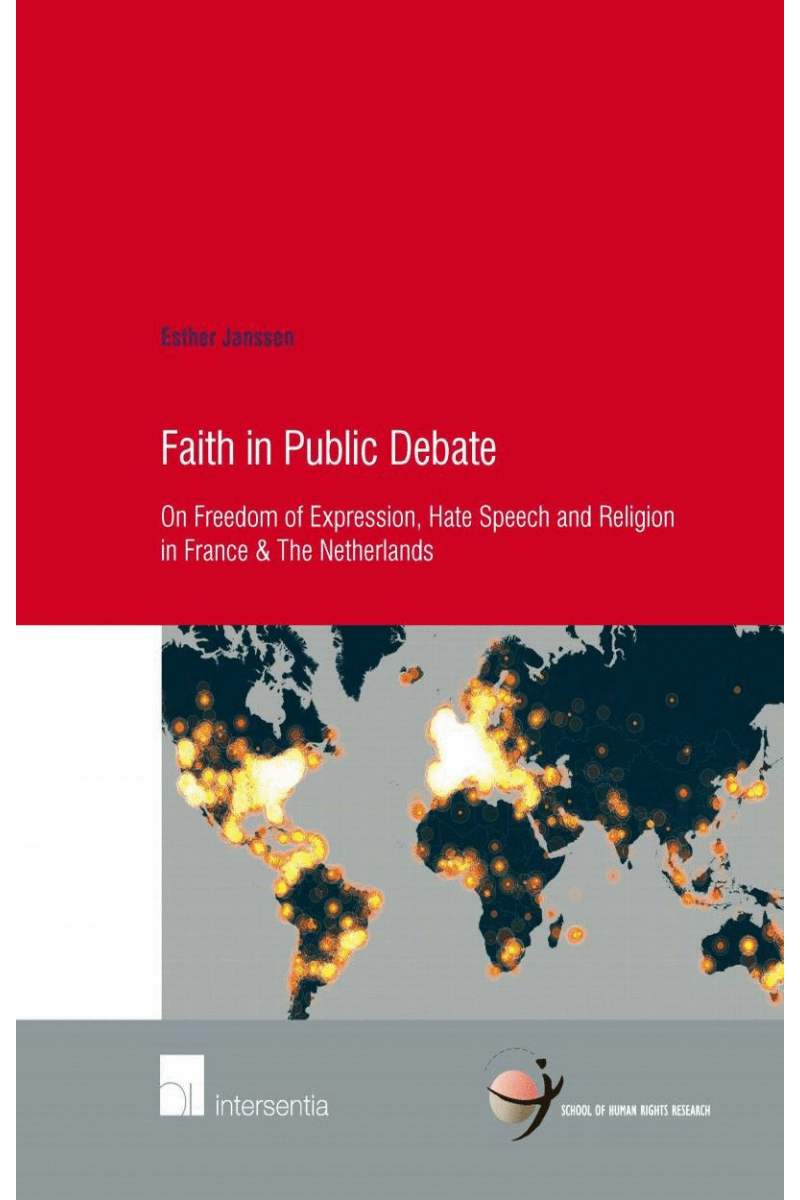 maestro
mastercard
visa
maestro
mastercard
visa

Faith in Public Debate
On Freedom of Expression, Hate Speech and Religion in France & the Netherlands

Should a politician be free to fiercely attack the religion of a sector of the population? Should he be allowed to strongly reject the culture of a particular minority group? Should religious adherents be allowed to advocate the transition from a democratic to a theocratic state? Should a satirical magazine be free to mock religious figures and practices? These sort of questions concern ‘the place of faith in public debate’ and continue to dominate public discussion that has been fuelled by a series of events, including the terrorist attacks in New York, Madrid and London; the assassination of Dutch film director Theo van Gogh; the affair of the Danish Cartoons; the prosecution of Dutch politician Geert Wilders for his statements on Islam and Muslims; and the terrorist attack on French satirical magazine Charlie Hebdo in Paris.
The overarching question triggered by these events concerns the relationship between freedom of expression and the regulation of ‘hate speech’; which forms of hate speech should the state prohibit, on what grounds and by which means? Notably, the restriction of hate speech uttered in the context of the public debate about multiculturalism, immigration, integration and Islam, and of religious fundamentalism has become a topic of lively discussion.
This research constitutes the first international comparative study that provides a profound analysis of the law on hate speech in France and the Netherlands and under European and international law. It thoroughly examines the national legislation, its drafting history, policy and other legal documents and case law including famous legal cases against Dutch politician Geert Wilders, French politician Jean-Marie Le Pen and le Front National, French comedian Dieudonné and satirical magazine Charlie Hebdo. It also makes reference to the most recent international hate speech literature and discusses its key issues. This book can, thereby, form a source of inspiration for anyone interested or involved in the regulation of hate speech: academics; legislators; judges; prosecutors; politicians; interested citizens; and involved NGO’s and can contribute to the ‘faith in public debate’, by elucidating its possible boundaries.
‘This study contains a thorough and detailed description, comparison and analysis of Dutch and French legislation and case law concerning hate speech. It focuses on the most sensitive issues of freedom of expression and its limitations: hate speech related to race and religion. The book highlights the differences in the Dutch and French approach, takes into account the jurisprudence of the European Court of Human Rights, criticizes the inconsistencies in the case law, and formulates concepts and proposals with regard to the scope and boundaries of the freedom of expression. It is a comprehensive source of information and provides insight for all who deal with these issues in practice and in theoretical studies.’
Ben Vermeulen, Member of the Council of State, Professor of Law, Radboud University Nijmegen
'Esther Janssen has written an impressive book, which is as thorough as it is captivating. Its publication is very timely because hate speech has become a pressing issue in so many jurisdictions. Including France, rather than the U.S or the UK, in the comparison is both fortunate and refreshing.'
Tom Zwart, Professor of Human Rights, Utrecht University and Director of the Netherlands School of Human Rights Research
‘This study opens up new perspectives on the theory of freedom of expression and freedom of religion, which has until now had a one-sided focus on the Anglo-Saxon tradition. With its thorough and clear analysis of the French doctrine and case law on the subject and comparison of the results with European and Dutch law, it offers important new insights into how to shape the law in a world divided by intense religious conflicts.’
Egbert J. Dommering, Honorary Professor of Theory of Information Law, University of Amsterdam
‘Hate speech and blasphemy have long been topical issues, but they are even more so in the aftermath of what happened to Charlie Hebdo. If only for that reason, a book like this one, which objectively and neutrally analyses the consistency of legal rules and case-law in this difficult area, should be warmly welcomed. This book is all the more valuable because of the author’s choice to provide a comprehensive comparison of the legal responses in France and the Netherlands – two national systems with very different traditions of regulation and different attitudes towards freedom of expression. Esther Janssen thus provides a sound and comprehensive overview of the history and functioning of both systems, as well as of the European Court of Human Rights, which makes this book a good read for anyone interested in blasphemy and hate speech in modern-day Western European legal systems.’
Janneke Gerards, Professor of European Law, Radboud University Nijmegen
| Type of product | Book |
|---|---|
| Format | Paperback |
| EAN / ISSN | 9781780683096 |
| Series name | Human Rights Research Series |
| Weight | 1090 g |
| Status | Available |
| Number of pages | xx + 638 p. |
| Access to exercice | No |
| Publisher | Intersentia |
| Language | English |
| Publication Date | Apr 10, 2015 |
| Available on Strada Belgique | No |
| Available on Strada Europe | No |
| Available on Strada Luxembourg | No |
Downloads
- Table of Contents
- Chapter 1. General Introduction
- Chapter 2. Analytical Framework
- Chapter 3. European and International Law
- Chapter 4. France
- Chapter 5. The Netherlands
- Chapter 6. Analysis And Conclusion
- Bibliography
- Samenvatting
- School of Human Rights Research Series